Is Swiss Cheese Healthy? Unveiling the Nutritional Benefits and Drawbacks. Discover whether Swiss cheese is a healthy choice for your diet. Explore its nutritional benefits, potential downsides, and how it compares to other cheeses. Learn how to enjoy Swiss cheese as part of a balanced diet.
Introduction
Swiss cheese often sparks curiosity among cheese enthusiasts and health-conscious individuals alike. With its distinctive holes and mild flavor, Swiss cheese has carved out a special place in many diets. But is Swiss cheese truly a healthy choice? In this article, we’ll dive into the nutritional benefits and potential drawbacks of Swiss cheese, compare it with other types of cheese, and provide insights on how to incorporate it into a balanced diet.
Is Swiss Cheese Healthy
What is Swiss Cheese?

Origin and History
Swiss cheese, also known as Emmental cheese, originates from Switzerland. Its name is derived from the Emmental region, where it was first produced. This cheese has been around for centuries, dating back to the 13th century. The characteristic holes, or “eyes,” in Swiss cheese are the result of carbon dioxide bubbles released by bacteria during fermentation.
Types of Swiss Cheese
Swiss cheese is not a one-size-fits-all category. Several types of Swiss cheese are available, each with unique characteristics:
- Emmental: The classic Swiss cheese with large holes and a nutty flavor.
- Gruyère: Slightly stronger in flavor and used in many traditional Swiss dishes.
- Appenzeller: Known for its spicy and robust taste.
Understanding the variations can help you choose the Swiss cheese that best suits your taste and dietary needs.
Is Swiss Cheese Healthy
Nutritional Profile of Swiss Cheese
Macronutrients
Swiss cheese is a rich source of several essential macronutrients:
- Protein: Swiss cheese provides a good amount of protein, which is essential for muscle repair and growth.
- Fat: It contains a moderate amount of fat, primarily saturated fat, which can impact heart health if consumed in excess.
- Carbohydrates: Swiss cheese is low in carbohydrates, making it suitable for low-carb diets.
Micronutrients
Swiss cheese also offers a variety of micronutrients:
- Calcium: Essential for bone health and muscle function.
- Phosphorus: Works alongside calcium to maintain strong bones and teeth.
- Vitamin B12: Important for nerve function and red blood cell production.
Is Swiss Cheese Healthy
Health Benefits of Swiss Cheese

Bone Health
One of the primary benefits of Swiss cheese is its high calcium content. Calcium is vital for maintaining strong bones and teeth. Swiss cheese also contains phosphorus, which works in tandem with calcium to enhance bone health.
Digestive Health
Swiss cheese contains probiotics, which are beneficial bacteria that support digestive health. These probiotics can help maintain a healthy gut flora, potentially improving digestion and nutrient absorption.
Weight Management
Despite its fat content, Swiss cheese can be part of a balanced diet aimed at weight management. The protein in Swiss cheese can help keep you feeling full longer, reducing the likelihood of overeating.
Is Swiss Cheese Healthy
Potential Downsides of Swiss Cheese
High Fat Content
Swiss cheese does contain a significant amount of fat, particularly saturated fat. Excessive consumption of saturated fat can contribute to heart disease, so it’s important to enjoy Swiss cheese in moderation.
Sodium Levels
Swiss cheese can be high in sodium, which can contribute to high blood pressure if consumed in large amounts. It’s crucial for individuals with hypertension to monitor their sodium intake.
Is Swiss Cheese Healthy
Swiss Cheese vs. Other Cheeses
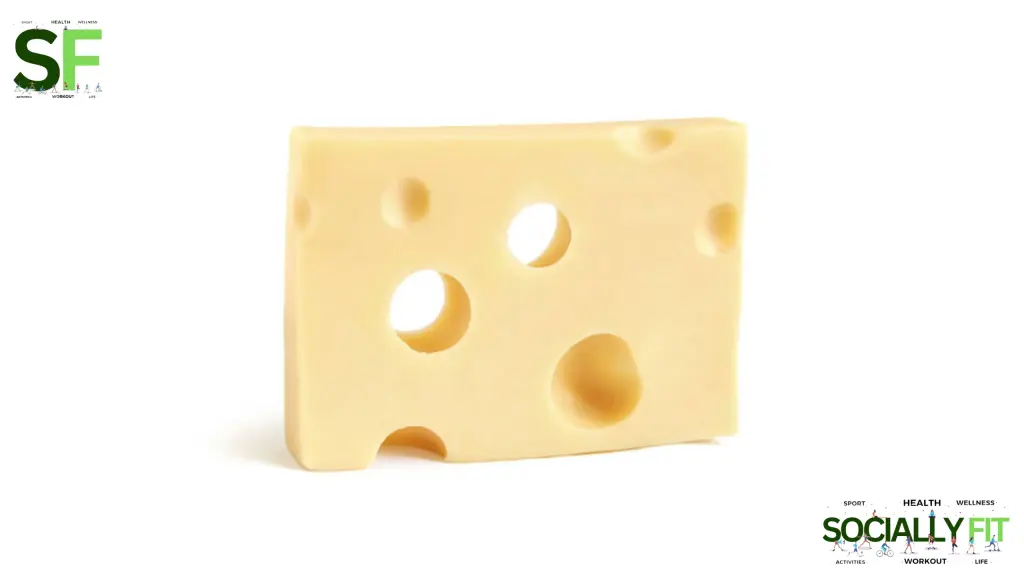
Swiss Cheese vs. Cheddar
- Flavor: Swiss cheese has a milder taste compared to the sharpness of cheddar.
- Nutritional Content: Swiss cheese generally has fewer calories and less fat compared to cheddar, making it a lighter option.
Swiss Cheese vs. Mozzarella
- Texture: Swiss cheese has a firm texture with holes, while mozzarella is softer and more elastic.
- Calories: Mozzarella is often lower in calories compared to Swiss cheese, which can be beneficial for calorie-conscious individuals.
Swiss Cheese vs. Gouda
- Taste: Gouda is typically sweeter and creamier than Swiss cheese.
- Fat Content: Gouda can be higher in fat compared to Swiss cheese, depending on the variety.
Is Swiss Cheese Healthy
Swiss Cheese in a Balanced Diet
Portion Control
To enjoy the benefits of Swiss cheese without overdoing it, practice portion control. A small serving can provide the flavor and nutrients you seek while keeping fat and sodium levels in check.
Incorporating Swiss Cheese
Swiss cheese can be incorporated into various dishes, from sandwiches to salads. Consider using it as a topping or in recipes where its flavor can complement other ingredients without overwhelming your dish.
Is Swiss Cheese Healthy
10 Advantages of Swiss Cheese Being Healthy
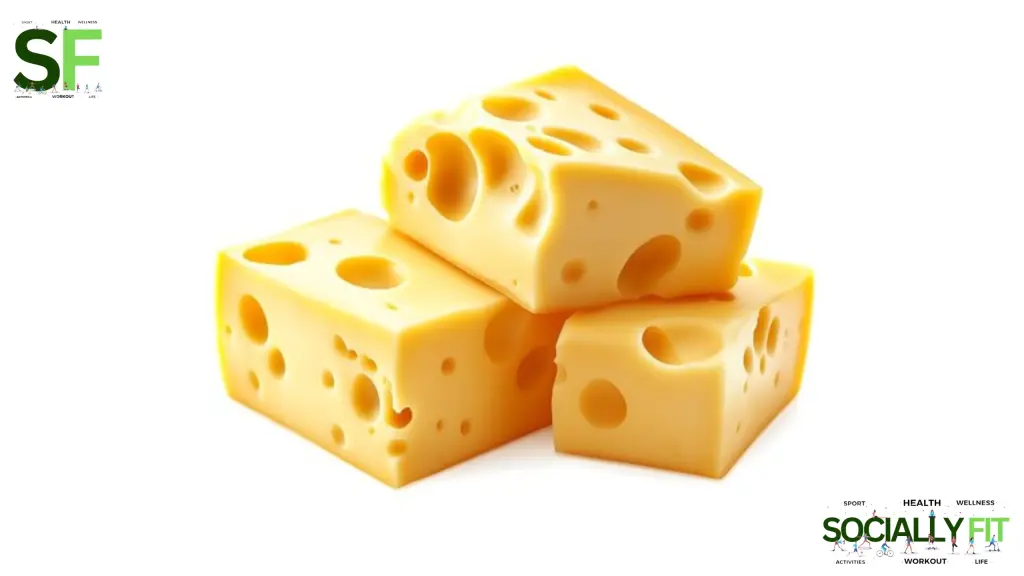
- High Calcium Content: Swiss cheese is rich in calcium, essential for maintaining strong bones and teeth. This makes it a beneficial option for supporting bone health.
- Protein Source: It provides a good amount of protein, which is crucial for muscle repair, growth, and overall body maintenance.
- Low in Carbohydrates: Swiss cheese has a low carbohydrate content, making it suitable for low-carb and ketogenic diets.
- Contains Probiotics: It has beneficial bacteria that can support digestive health and help maintain a healthy gut flora.
- Lower Sodium Levels: Compared to many other cheeses, Swiss cheese is lower in sodium, which is advantageous for managing blood pressure.
- Moderate Fat Content: Swiss cheese has a moderate fat content, which can be part of a balanced diet without being excessively high in fat.
- Rich in Vitamin B12: It contains vitamin B12, which is important for nerve function and red blood cell formation.
- Supports Weight Management: Due to its high protein content and lower fat, Swiss cheese can help with satiety, reducing overall calorie intake.
- Variety of Uses: Its mild flavor and versatile texture make it suitable for a wide range of dishes, from sandwiches to salads.
- Bone Health Benefits: The combination of calcium and phosphorus in Swiss cheese supports strong bones and can help prevent osteoporosis.
Is Swiss Cheese Healthy
10 Disadvantages of Swiss Cheese Being Healthy

- High Fat Content: Despite being moderate, the fat content, especially saturated fat, may contribute to heart disease if consumed in large quantities.
- Potential Lactose Content: Swiss cheese still contains lactose, which can be problematic for those with lactose intolerance or sensitivity.
- Sodium Concerns: While lower than some cheeses, it still contains sodium, which can be a concern for individuals with hypertension.
- Caloric Density: Swiss cheese is calorie-dense, and consuming it in excess can lead to weight gain.
- Limited Probiotics: The probiotic content in Swiss cheese is moderate and not as high as in yogurt or fermented dairy products.
- Not Suitable for Vegan Diets: Swiss cheese, being a dairy product, is not an option for those following a vegan diet.
- Potential Allergens: It may cause allergic reactions in individuals who are sensitive to dairy proteins.
- High Cost: Swiss cheese can be more expensive compared to other types of cheese, which might be a factor for budget-conscious consumers.
- Processing Concerns: Some commercially available Swiss cheese might be processed, potentially including additives or preservatives that could be less healthy.
- Risk of Overconsumption: Its rich flavor and versatility can lead to overeating, which could impact overall dietary balance and health.
Is Swiss Cheese Healthy
Is Swiss Cheese Healthier Than Cheddar Cheese?
| Aspect | Swiss Cheese | Cheddar Cheese | Description |
|---|---|---|---|
| Calories (per ounce) | ~108 kcal | ~114 kcal | Swiss cheese generally has slightly fewer calories than cheddar cheese. |
| Fat Content | ~8.5 grams | ~9.4 grams | Swiss cheese has a lower fat content compared to cheddar, which can be beneficial for heart health. |
| Sodium Levels | ~55 mg | ~174 mg | Swiss cheese is lower in sodium, which can be better for blood pressure management. |
| Protein Content | ~8 grams | ~7 grams | Swiss cheese has a slightly higher protein content, which is beneficial for muscle repair. |
| Calcium | ~270 mg | ~200 mg | Swiss cheese generally contains more calcium, supporting stronger bones and teeth. |
Analysis:
- Calories: Opt for Swiss cheese if you’re aiming to reduce calorie intake while still enjoying cheese.
- Fat Content: Choose Swiss cheese for a lower fat option that’s still satisfying.
- Sodium Levels: Swiss cheese is a better choice for those monitoring their sodium intake.
- Protein Content: Swiss cheese offers a bit more protein, which can be advantageous for muscle maintenance.
- Calcium: If you’re looking to increase your calcium intake, Swiss cheese may be the better option.
Is Swiss Cheese Healthy
How Does Swiss Cheese Compare to Mozzarella in Terms of Calories and Fat?
| Aspect | Swiss Cheese | Mozzarella Cheese | Description |
|---|---|---|---|
| Calories (per ounce) | ~108 kcal | ~85 kcal | Mozzarella cheese is lower in calories compared to Swiss cheese. |
| Fat Content | ~8.5 grams | ~6.3 grams | Mozzarella has less fat than Swiss cheese, making it a lighter choice. |
| Sodium Levels | ~55 mg | ~176 mg | Mozzarella cheese has higher sodium levels, which could be a concern for those on a low-sodium diet. |
| Protein Content | ~8 grams | ~6 grams | Swiss cheese has slightly more protein compared to mozzarella. |
| Calcium | ~270 mg | ~180 mg | Swiss cheese provides more calcium, which is important for bone health. |
Analysis:
- Calories: Choose mozzarella if you’re looking to reduce calorie intake.
- Fat Content: Mozzarella is a better option for lower fat content.
- Sodium Levels: Be cautious with mozzarella if you’re managing your sodium intake.
- Protein Content: For higher protein, Swiss cheese has a slight edge over mozzarella.
- Calcium: Swiss cheese is preferable if you need a higher calcium boost.
Is Swiss Cheese Healthy
What Are the Key Differences in Nutritional Value Between Swiss Cheese and Gouda?
| Aspect | Swiss Cheese | Gouda Cheese | Description |
|---|---|---|---|
| Calories (per ounce) | ~108 kcal | ~110 kcal | Both cheeses are relatively close in calorie content. |
| Fat Content | ~8.5 grams | ~8.9 grams | Gouda has slightly more fat compared to Swiss cheese. |
| Sodium Levels | ~55 mg | ~174 mg | Gouda is higher in sodium, which might not be ideal for those watching their salt intake. |
| Protein Content | ~8 grams | ~7 grams | Swiss cheese has a bit more protein than Gouda. |
| Calcium | ~270 mg | ~200 mg | Swiss cheese typically provides more calcium than Gouda. |
Analysis:
- Calories: Both cheeses are similar in calorie content; choose based on other factors.
- Fat Content: Swiss cheese is slightly lower in fat, which could be preferable for heart health.
- Sodium Levels: Swiss cheese is the better option if reducing sodium intake is a priority.
- Protein Content: Swiss cheese has a slight advantage in protein content.
- Calcium: For higher calcium, Swiss cheese is generally the better choice.
Is Swiss Cheese Healthy
Is Swiss Cheese a Better Choice Than American Cheese for a Healthier Diet?
| Aspect | Swiss Cheese | American Cheese | Description |
|---|---|---|---|
| Calories (per ounce) | ~108 kcal | ~104 kcal | American cheese is marginally lower in calories compared to Swiss cheese. |
| Fat Content | ~8.5 grams | ~9 grams | American cheese has a slightly higher fat content. |
| Sodium Levels | ~55 mg | ~300 mg | Swiss cheese is significantly lower in sodium, which can be better for overall health. |
| Protein Content | ~8 grams | ~5 grams | Swiss cheese contains more protein, aiding in muscle repair and maintenance. |
| Calcium | ~270 mg | ~200 mg | Swiss cheese generally provides more calcium than American cheese. |
Analysis:
- Calories: Both cheeses are similar in calories, so consider other factors.
- Fat Content: Swiss cheese is slightly lower in fat.
- Sodium Levels: Swiss cheese is a better choice if you’re concerned about sodium intake.
- Protein Content: Swiss cheese provides more protein, beneficial for maintaining muscle mass.
- Calcium: Swiss cheese is preferable for a higher calcium intake.
Is Swiss Cheese Healthy
How Does the Probiotic Content in Swiss Cheese Compare to That in Other Cheeses?
| Aspect | Swiss Cheese | Yogurt Cheese | Parmesan Cheese | Gouda Cheese | Ricotta Cheese | Description |
|---|---|---|---|---|---|---|
| Probiotic Levels | Moderate | High | Low | Moderate | Low | Swiss cheese has moderate probiotic levels compared to yogurt cheese, which is higher. |
| Taste | Mild | Tangy | Savory | Nutty | Mild | Swiss cheese has a milder taste compared to yogurt cheese, which is tangier. |
| Texture | Firm | Soft | Hard | Firm | Soft | Swiss cheese has a firm texture, unlike the soft texture of yogurt cheese. |
| Calcium Content | High | Moderate | Very high | High | Moderate | Swiss cheese provides a good amount of calcium, though Parmesan is higher. |
| Digestive Health | Beneficial | Highly beneficial | Minimal | Beneficial | Minimal | Swiss cheese and yogurt cheese both benefit digestive health, but yogurt cheese is superior. |
Analysis:
- Probiotic Levels: Opt for yogurt cheese if you’re specifically seeking high probiotic content.
- Taste: Choose Swiss cheese if you prefer a milder flavor.
- Texture: Swiss cheese offers a firmer texture compared to the soft yogurt cheese.
- Calcium Content: For the highest calcium, Parmesan cheese stands out.
- Digestive Health: Swiss cheese is beneficial, but yogurt cheese is superior for digestive health due to higher probiotics.
Feel free to use these comparisons to inform your choices regarding Swiss cheese and its place in a healthy diet.
Is Swiss Cheese Healthy
FAQs: Is Swiss Cheese Healthy?

1. Is Swiss cheese healthier than other types of cheese?
Swiss cheese is relatively lower in fat and calories compared to some other cheeses, making it a healthier option when consumed in moderation.
2. Can I eat Swiss cheese if I am lactose intolerant?
Swiss cheese has lower lactose levels compared to some other cheeses, but it may still affect those with severe lactose intolerance.
3. How much Swiss cheese can I eat in a day?
Moderation is key. A serving size of about 1 ounce (28 grams) per day is generally considered reasonable for most people.
4. Does Swiss cheese contain probiotics?
Yes, Swiss cheese contains probiotics, which are beneficial for gut health.
5. How can I include Swiss cheese in my diet?
You can add Swiss cheese to sandwiches, salads, and casseroles or enjoy it on its own as a snack.
Is Swiss Cheese Healthy
Conclusion: Is Swiss Cheese Healthy?
Swiss cheese, with its distinctive flavor and nutritional profile, can be a healthy addition to your diet when consumed in moderation. It offers several health benefits, including support for bone health and digestive function. However, its fat and sodium content warrant mindful consumption. By understanding its nutritional profile and comparing it to other cheeses, you can make informed dietary choices and enjoy Swiss cheese as part of a balanced diet.
Click here to know more about weight loss. Subscribe to Workout with Hunar for weight loss and workout videos.








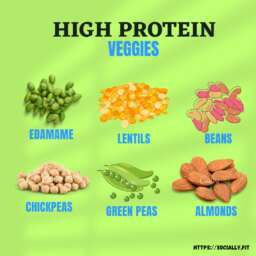
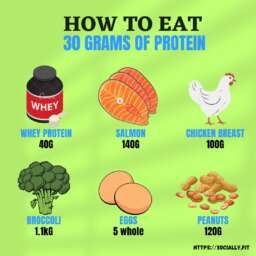

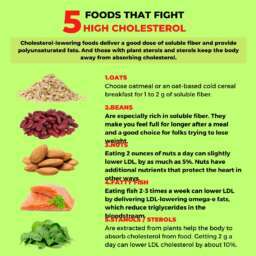
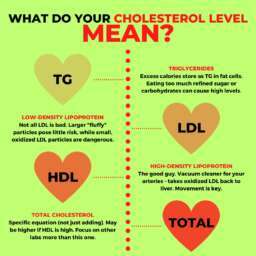


One thought on “Is Swiss Cheese Healthy?”